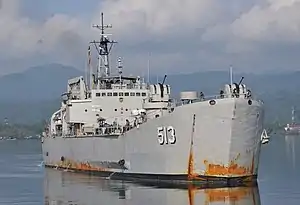Teluk Semangka-class tank landing ship
The Teluk Semangka class is a class of tank landing ships operated by the Indonesian Navy. The ships were built by the Korea-Tacoma Shipyard (now Hanjin Heavy Industries), Masan, South Korea in the early 1980s.
 KRI Teluk Penyu in 2014 | |
| Class overview | |
|---|---|
| Name | Teluk Semangka class |
| Builders | Korea Tacoma Shipbuilding, Masan |
| Operators | |
| Preceded by | Teluk Langsa class |
| Succeeded by | Teluk Gilimanuk class |
| Built | 1980-1982 |
| In commission | 1981-present |
| Planned | 6 |
| Completed | 6 |
| Active | 3 |
| Retired | 3 |
| General characteristics | |
| Type | Tank landing ship |
| Displacement | 3,750 long tons (3,810 t) full |
| Length | 100 m (330 ft) |
| Beam | 14.4 m (47 ft) |
| Draught | 4.2 m (14 ft) |
| Propulsion |
|
| Speed | 15 knots (28 km/h; 17 mph) |
| Range | 7,500 nmi (13,900 km; 8,600 mi) at 13 knots (24 km/h; 15 mph) |
| Boats & landing craft carried | 2-4 × LCVPs |
| Capacity |
|
| Troops | 200 |
| Complement | 90 (13 officers) |
| Sensors and processing systems |
|
| Armament |
|
| Aircraft carried |
|
| Aviation facilities | |
Design
The class design was based on the LST-542-class tank landing ship.[1] The class has a length of 100 m (330 ft), a beam of 14.4 m (47 ft), with a draught of 4.2 m (14 ft) and their displacement is 3,750 long tons (3,810 t) at full load. The ships is powered by two diesel engines, with total sustained power output of 12,800 metric horsepower (9.4 MW) distributed in two shaft. Teluk Semangka class has a speed of 15 knots (28 km/h), with range of 7,500 nautical miles (13,900 km) while cruising at 13 knots (24 km/h).[2]
Teluk Semangka class has a capacity of 200 troops, 1,800 long tons (1,800 t) of cargo (which includes 17 main battle tanks), and 2 (4 for Teluk Semangka and Teluk Mandar)[3] LCVPs on davits.[2] The ships has a complement of 90 personnel, including 13 officers. Two last ships of the class, Teluk Ende and Teluk Banten, are command ships and has distinguishing features such as the LCVP davits located forward of the bridge and the exhaust vents above the waterlines instead of funnels found on the other ships.[2]
The ships are armed with three single Bofors 40 mm L/70 guns, two single Rheinmettal 20 mm autocannons, and two single DShK 12.7 mm heavy machine guns.[2][4] The command variant has same weaponry with one less 40 mm gun.[2]
It was noted that Teluk Ende was outfitted as a hospital ship but later was reverted back to landing ship and the Red Cross markings were removed.[5]
The ships has helicopter decks in the amidships and aft for small to medium helicopter such as Westland Wasp or MBB Bo 105,[2] with the command variants having hangar facility and helicopter deck in the aft with provisions for up to 3 Eurocopter AS332 Super Puma helicopters.[1]
Ships in the class
| Hull no. | Name | Builder | Launched | Commissioned | Decommissioned | |
|---|---|---|---|---|---|---|
| 512 | Teluk Semangka | Korea Tacoma Shipbuiling, Masan | 3 May 1980 | 20 January 1981 | 24 April 2013 | |
| 513 | Teluk Penyu | 20 January 1981 | 16 August 2019 | |||
| 514 | Teluk Mandar | July 1981 | 27 January 2022[6] | |||
| 515 | Teluk Sampit | June 1981 | ||||
| Command variant | ||||||
| 516 | Teluk Banten | Korea Tacoma Shipbuiling, Masan | May 1982 | |||
| 517 | Teluk Ende | 2 September 1982 | ||||
References
- Gardiner, Chumbley & Budzbon 1995, p. 180.
- Saunders 2009, p. 361.
- "KRI Teluk Semangka 512 – LST Besutan Korea Selatan Pertama Yang Akhiri Masa Tugas". indomiliter.com (in Indonesian). 27 April 2013. Retrieved 18 August 2021.
- "Kapal TNI AL KRI Teluk Banten Sukses Hancurkan Sasaran". tni.mil.id (in Indonesian). 22 October 2019. Retrieved 18 August 2021.
- "LST Teluk Semangka - Indonesia". www.globalsecurity.org. Retrieved 18 August 2021.
- Safitri, Eva. "Komisi I DPR Setujui Penjualan Eks KRI Teluk Penyu-KRI Teluk Mandar". detiknews (in Indonesian). Retrieved 30 October 2022.